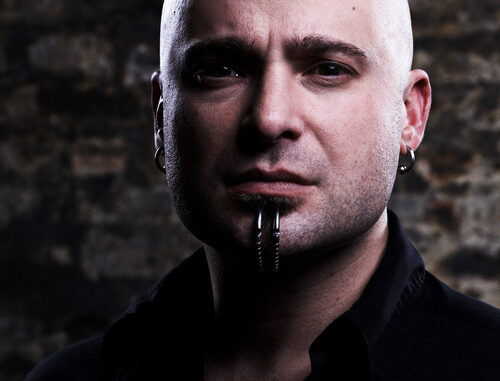
Formed in the gritty heart of Chicago in 1994, Disturbed emerged as a storm in the making—one that would shake the foundations of modern metal. Built on raw emotion, relentless energy, and an unapologetically aggressive sound, the band quickly carved out a niche in a rapidly evolving musical landscape. Their rise wasn’t overnight; it was earned through years of dedication, trial, and transformation. The story of Disturbed is one of passion, perseverance, and the unmistakable power of a voice that would come to define an era.
The original lineup—Dan Donegan on guitar, Steve “Fuzz” Kmak on bass, Mike Wengren on drums, and a yet-to-be-discovered frontman—was already experimenting with a heavy, industrial-infused style. But it wasn’t until David Draiman entered the scene that the band’s identity truly crystallized. Draiman, with his commanding baritone, dramatic delivery, and spiritually charged lyrics, elevated the group from local potential to a force to be reckoned with. His voice wasn’t just powerful—it was distinct, deeply emotive, and instantly recognizable.
Draiman’s background helped shape the lyrical depth of Disturbed’s music. Raised in a religious household and trained as a cantor, his voice carried the weight of ancient melodies and spiritual conviction. This influence bled into the band’s sound, creating tracks that felt both primal and profound. Whether delivering guttural growls or soaring melodic choruses, Draiman became the cornerstone of the band’s identity.
In 2000, the release of The Sickness shattered expectations. With hits like “Down with the Sickness” and “Stupify,” Disturbed launched into mainstream success, selling millions of copies and planting their flag firmly in the nu-metal movement. But what set them apart from their peers was not just the ferocity of their sound—it was the clarity and message behind the chaos. Draiman’s lyrics often dealt with inner demons, society’s ills, and the human condition, resonating deeply with fans who saw their own pain mirrored in the music.
As the band evolved, so did their sound. Albums like Believe (2002), Ten Thousand Fists (2005), and Indestructible (2008) showcased their ability to grow while staying true to their roots. Each project added layers to their sonic profile, blending blistering riffs with orchestral elements, anthemic choruses, and emotionally charged themes. Draiman continued to be the vocal and spiritual anchor, balancing intensity with vulnerability in a way few frontmen could.
Behind the scenes, Disturbed dealt with challenges that tested their unity. Internal tensions, industry pressures, and the demands of constant touring threatened to fracture the band. But instead of crumbling, they used the adversity as fuel. They took a hiatus in 2011, prompting speculation about a possible end. However, in 2015, they roared back with Immortalized, led by a haunting cover of “The Sound of Silence” that displayed a previously unseen side of Draiman’s vocal range—and introduced the band to a whole new audience.
What made that cover so impactful wasn’t just its arrangement, but the raw, emotional performance from Draiman. Stripped of distortion and aggression, his voice was left exposed—and it was beautiful. It reminded the world that behind the growls and screams was a vocalist with rare control, depth, and presence. That moment wasn’t just a highlight in their discography; it was a statement about the band’s artistic versatility and Draiman’s enduring talent.
Disturbed’s connection with their fan base has always been unusually intimate. Their concerts feel like communal rituals, where shared pain, rage, and hope come together in cathartic release. Draiman often speaks directly to the audience, not just as a performer but as a survivor—of depression, addiction, and self-doubt. This openness has only deepened the loyalty of their listeners, many of whom credit the band’s music with helping them through their darkest times.
While the lineup has seen changes—most notably the departure of original bassist Fuzz—the core of Disturbed has remained intact. Dan Donegan’s intricate riffs, Wengren’s thunderous drums, and the band’s unrelenting commitment to their craft have ensured that their music never loses its edge. Every album feels like a new chapter in a much larger saga—one of resilience, defiance, and a refusal to be silenced.
What separates Disturbed from countless other metal acts isn’t just their longevity or chart success. It’s their ability to adapt without losing their essence, to confront personal and societal demons with unflinching honesty, and to continue delivering performances that feel urgent and vital. Draiman’s voice, both literal and metaphorical, remains one of the most potent in heavy music—a beacon for those navigating a chaotic world.
As the band approaches its third decade, there’s no sign of slowing down. Whispers of a 2026 album suggest they’re ready to once again evolve their sound and confront new themes. If history is any guide, fans can expect a project that challenges expectations and raises the bar—not just for Disturbed, but for the genre itself.
Disturbed’s journey is far from over. And as long as David Draiman has something to say—and a stage from which to say it—the world will continue to listen. His voice isn’t just powerful; it’s necessary. And in the ever-changing landscape of heavy music, Disturbed remains a steady, thunderous pulse—a reminder that metal can be both brutal and deeply human.

Leave a Reply